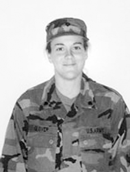Services members’ advocacy group issues findings based on 2004 military data
For the first time, a detailed analysis has been completed of soldiers discharged from the U.S. military for being gay. The data reveals that the armed forces continue to discharge badly needed specialists, but also that some commanders might be tolerating the presence of gays and lesbians in their units.
The policy known as Don’t Ask, Don’t Tell (DADT), put in place early in former Pres. Bill Cllinton’s first term, bans gays and lesbians from serving openly in the American armed forces.
Under DADT, 653 men and women were discharged in 2004, but gay discharges have dropped almost in half since September 11, 2001.
As part of last year’s Department of Defense Appropriations bill, Congress mandated that information regarding a soldier’s specific duties, unit, age and gender be recorded for all involuntary separations from the military.
The Service Members Legal Defense Network (SLDN), an organization fighting to overturn DADT, recently released a study based on the 2004 discharge data under the anti-gay policy and pointed to several major trends that the figures reveal.
The first finding is that less than a quarter of those discharged come from units directly in engaged in supporting the operations in Iraq and Afghanistan.
“Commanders in the field do not care if gays and lesbians are deployed in a war zone,” said Steve Ralls, a spokesperson for SLDN.
The figures also confirmed that DADT disproportionately affects women. Women accounted for a full third of all DADT discharges while only making up about 15 percent of the military. In two branches, the impact on women was even greater. More than 38 percent of Army gay discharges were women. Female marines made up 24 percent of gay discharges, but only composed six percent of that force.
“Women are targets under DADT because of popular perception that any woman in the military is a lesbian,” Ralls said. “And they are sometimes labeled lesbians because they don’t accept the advances of male colleagues. Rumor and innuendo are enough to get you discharged under DADT because it is up to the service member to prove they are not gay.”
Lt. Col. Ellen Krenke, a Pentagon spokeswoman said she couldn’t speculate as to why women were over-represented in gay discharges. But she did confirm that women service members were more likely to be discharged than men.
“Female discharges under ‘Don’t Ask, Don’t Tell’ have been around 38 percent for the last five years,” she said.
Elaine Donnelly, director of the Center for Military Readiness, an advocacy group that wants the gay ban in the military fully reinstated, countered SLDN’s explanation, arguing that the simple reason more women are being discharged is that many women probably want to get out of the service.
“More women are saying they are gay,” Donnelly said as explanation for the high rate of female separations, implying not every statement of homosexuality is truthful. “There is a war going on and combat is not something many women aspire to.”
Donnelly was also quick to add that the whole problem of gay discharges could be avoided if the Pentagon ended DADT and simply barred gay soldiers by asking new recruits about their sexual orientation.
“But it’s ridiculous to think they are discharging people based on accusations alone,” Donnelly maintained. “The military doesn’t want to dismiss good soldiers. They need people, now more than ever.”
The data also reveals a military still losing ground in crucial areas. Forty-one healthcare professionals, 30 sonar and radar specialists, and nine language specialists were removed from service in 2004.
Ralls said that any more detail regarding these categories is not possible. The military is required only to record under which group a discharged person belonged, but not if they were a surgeon, nurse or medic, all of which would be listed under “healthcare professional.”
The defense department data also does not indicate the language of expertise for the language specialists.
Because the U.S. military has such a pressing need for Arabic speakers, the House of Representatives recently passed a bill granting citizenship to 54 native Arabic speakers who have been working for the U.S. as translators in Iraq and Afghanistan. This is almost the same number of gay Arabic linguists discharged from the military since the start of DADT.
More than 50 percent of all gay discharges were among members 18 to 25 years old, typically soldiers in their first tour of service.
Two weeks ago, the Army issued a memo to all its commanders urging them to do everything possible to reduce the number of discharges among this younger group of soldiers. The memo also altered the protocol for discharges of soldiers who have abused drugs and alcohol, failed a physical fitness test or demonstrated unsatisfactory performance. The memo indicated this change was also a way to make it harder for discharges to occur.
The memo did not change the way DADT violations are prosecuted.
As admitted in the memo, these changes were a response to the lackluster recruiting the Army has experienced in the past five months. According to the Army Recruiting Command, enlistment in 2006 will only be half of what it was in 2004, raising the specter of a severe manpower shortage in a military branch already stretched thin.
It perhaps also explains why commanders on the front line tolerate their gay troops, as SLDN claims. Even though there is no way to assess if discharges among the units deployed in support of war operations has declined, Ralls said anecdotal evidence suggests an extremely tolerant atmosphere in such units.
“We are in contact with dozens of soldiers in Iraq who say they are out to their units and haven’t had a problem,” Ralls said.
gaycitynews.com


































